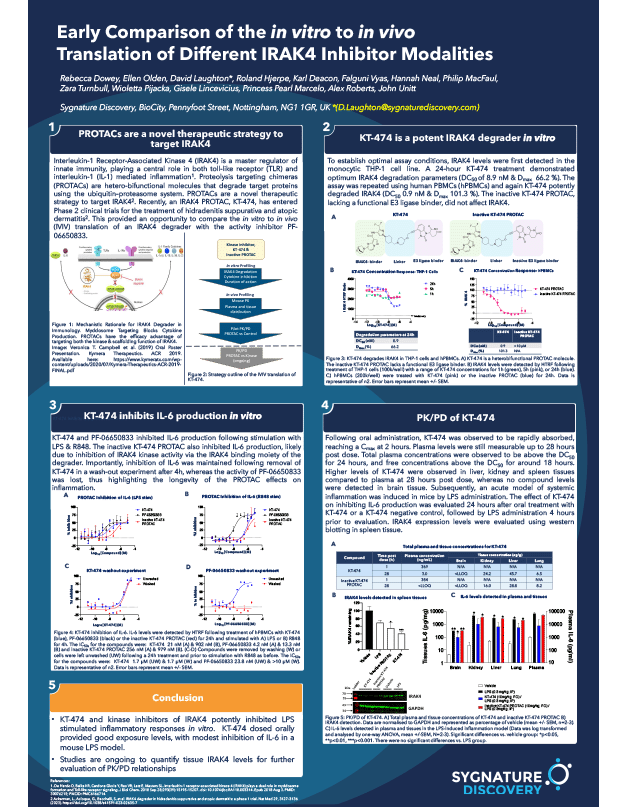Early Comparison of the in vitro to in vivo Translation of Different IRAK4 Inhibitor Modalities
Interleukin-1 Receptor-Associated Kinase 4 (IRAK4) is a master regulator of innate immunity, playing a central role in both toll-like receptor and interleukin-1 (IL-1) inflammation. Proteolysis targeting chimeras (PROTACs) are hetero-bifunctional molecules that degrade target proteins using the ubiquitin-proteasome system. This novel therapeutic modality inhibits IRAK4 and has the potential additional efficacy due to removing the protein’s scaffolding and kinase functions compared to kinase activity-only inhibitors like PF-06650833. A specific IRAK4 PROTAC, KT-474, has recently entered Phase 2 clinical trials to treat hidradenitis suppurativa and other conditions.
This scenario allowed us to compare the in vitro to in vivo translation of an IRAK4 degrader with an activity inhibitor. We began by evaluating the ability of KT-474 and PF-06650833 to degrade IRAK4 and inhibit downstream LPS-driven cytokine production in vitro using the THP-1 cell line and human peripheral blood monocytes (PBMCs). We then determined the PK of KT-474 and PF-06650833 before profiling both compounds in a mouse LPS model of acute inflammation.
Our findings reveal that KT-474 potently degrades IRAK4 (0.88 nM DC50, 101% Dmax) and inhibits LPS/R848-driven PBMC IL-6 production. Notably, the inhibitory effect of KT-474 is maintained following its removal, unlike PF-06650833, demonstrating the longevity of this therapeutic modality over conventional kinase activity inhibition. In mouse PK, KT-474 reaches a Cmax after 2 hours, with measurable plasma levels up to 24 hours, showcasing its unique features and potential benefits.
In summary, we have demonstrated that KT-474’s degradation of IRAK4 is an effective therapeutic modality for inhibiting cytokine generation in vitro, potentially with greater efficacy and longevity than conventional kinase activity inhibitors for treating various autoimmune diseases. Our next steps are to characterize the in vivo PK/PD for these different IRAK4 inhibitor modalities to determine if KT-474 exhibits greater longevity and efficacy, as shown in vitro.

